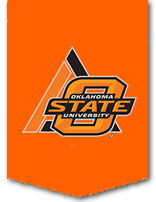Annual Research Symposium draws large crowd
By Rebecca Bailey
FAPC Communications Graduate Assistant
(Stillwater, Okla. – March 15, 2013) In conjunction with Oklahoma State University Research Week, the Robert M. Kerr Food & Agricultural Products Center held its annual Research Symposium to highlight the scholarly research and accomplishments of students and faculty.
The Feb. 19 event, sponsored by DuPont and the Institute of Food Technologists-Oklahoma section, kicked off with oral and poster presentations from OSU graduate students, and concluded with a keynote address and recognition of awards.
“The event provided an opportunity for graduate students to make presentations of their work and for researchers to network with others in the food and agricultural field and possibly foster future collaborations among colleagues,” said Peter Muriana, FAPC food microbiologist and chair of the symposium.
Student awards were presented in both the oral and poster presentation categories. The top student winners were Ee Chin Ng and Raj Adhikari in the oral and poster presentations, respectively. Other winners were Karthic Ramachandriya Dharma, second place in the oral presentations, and Paul Vijayakumar, second place in the poster presentations.
This year’s symposium caught the attention and interest of many as the keynote speaker, Janet E. Collins, IFT president-elect and senior manager in corporate regulatory affairs for DuPont Co., presented “The Impact of Science on Development of Global Food Standards.”
“As we look at a global food supply we are starting to see a collision of politics into policy,” Collins said. “We think we see it here in the U.S., but when you start talking about global standards, or global trade or global food supply, it’s really an issue that is increasingly problematic for us.”
Collins said it is a role of food scientists to educate people on these matters.
“It is very important to us as scientists, who will come forward to work in the industry or government or even in academia, to teach people about the scientific basis of decision-making, which is really important for us in the end to have a food supply that is not only safe, but secure,” Collins said.
Collins is a food scientist and nutritionist, with advocacy and policy development experience relating to food safety assessment, risk analysis, food labeling and health claims, nutritional contribution of foods and dietary exposure assessment, agricultural biotechnology issues and regulatory and scientific affairs functions of meat and dairy trade associations.
Collins said there is a lack of trust in the food industry that can be harmful.
“When consumers or media ask a question, what we say isn’t always believable to them,” Collins said. “This lack of trust is leading consumers in a direction that isn’t working.”
Asking questions, completing research and offering scientific data for decision-making can strengthen trust in the food industry.
“We have the safest food supply in the whole world, but we don’t trust that it’s okay, and I am not arguing for or against the U.S. food supply, I am just saying look at the data,” Collins said. “We have the data that shows us, and you can always ask questions, particularly you guys that are here at a university.”
Collins concluded her keynote by addressing what the public is exposed to in the news, including issues involving food safety, food nutritional quality, global food availability, non congruent-regulatory systems and environmental overlaps while urging people to get involved.
“These are the areas where global trade is impacted by science,” Collins said. “Scientists can have an impact on that by engaging or involving yourself. If you want to be in the middle of that conversation, if you hear about something that is happening and you are interested and you want to be involved, pick up the phone and invite yourself, ask questions, stick your nose in it, find out what it means, how it’s important and what you can do scientifically to impact it.”
For more information about the Research Symposium or to watch the video presentation of the keynote speaker, click here.
###
Oklahoma State University is a modern land- ‐grant system of interdisciplinary programs that prepares students for success. As Oklahoma’s only university with a statewide presence, OSU improves the lives of people in Oklahoma, the nation, and the world through integrated, high- ‐ quality teaching, research, and outreach. OSU has more than 35,000 students across its five- ‐ campus system and more than 23,000 on its Stillwater campus, with students from all 50 states and 118 nations. Established in 1890, OSU has graduated more than 235,000 students to serve the state of Oklahoma, the nation and the world.

